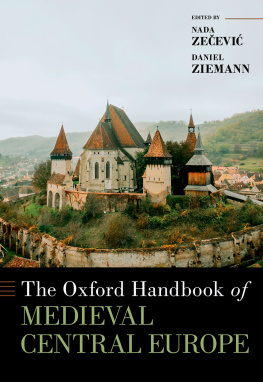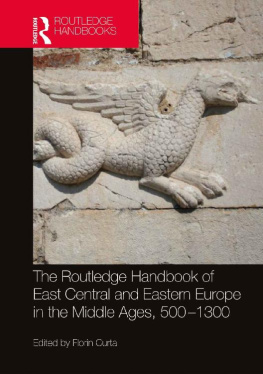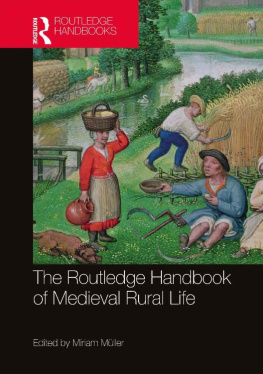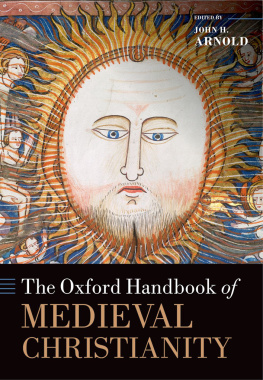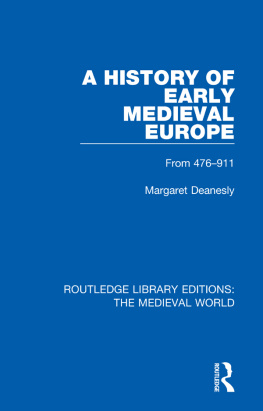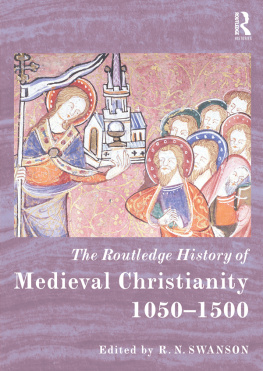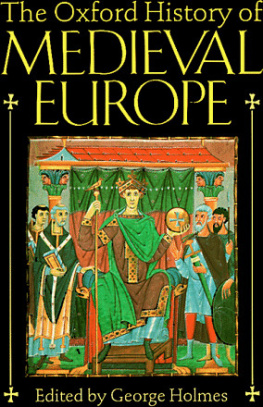The Oxford Handbook of
Medieval Central Europe

Oxford University Press is a department of the University of Oxford. It furthers the Universitys objective of excellence in research, scholarship, and education by publishing worldwide. Oxford is a registered trade mark of Oxford University Press in the UK and certain other countries.
Published in the United States of America by Oxford University Press
198 Madison Avenue, New York, NY 10016, United States of America.
Oxford University Press 2022
All rights reserved. No part of this publication may be reproduced, stored in a retrieval system, or transmitted, in any form or by any means, without the prior permission in writing of Oxford University Press, or as expressly permitted by law, by license, or under terms agreed with the appropriate reproduction rights organization. Inquiries concerning reproduction outside the scope of the above should be sent to the Rights Department, Oxford University Press, at the address above.
You must not circulate this work in any other form and you must impose this same condition on any acquirer.
Library of Congress Cataloging-in-Publication Data
Names: Zecevic, Nada, editor. | Ziemann, Daniel, editor.
Title: Oxford handbook of medieval Central Europe / Nada Zecevic, Daniel Ziemann.
Description: New York, NY : Oxford University Press, [2022] |
Includes bibliographical references and index. |
Identifiers: LCCN 2021056067 (print) | LCCN 2021056068 (ebook) |
ISBN 9780190920715 (hardback) | ISBN 9780190920739 (epub)
Subjects: LCSH: Europe, CentralHistoryTo 1500. |
Europe, CentralCivilization. | Civilization, Medieval.
Classification: LCC DAW1046 .O94 2022 (print) | LCC DAW1046 (ebook) |
DDC 943/.01dc23/eng/20220105
LC record available at https://lccn.loc.gov/2021056067
LC ebook record available at https://lccn.loc.gov/2021056068
DOI: 10.1093/oxfordhb/9780190920715.001.0001
About the Editors
Nada Zeevi teaches the history of the Balkans at Goldsmiths, University of London, where she also directs the Centre for the Study of the Balkans. She earned her PhD in Medieval Studies from the Central European University (CEU), Hungary (2004). Dr. Zeevis research focuses on the history of the Balkan peninsula and its global relations, the historical societies of this region, and interpretations of its past.
Daniel Ziemann is Associate Professor at the Department of Medieval Studies at Central European University (CEU) in Vienna. He is a medieval historian and received his PhD in history from the Johann Wolfgang Goethe University in Frankfurt on the Main in 2002. Prior to his appointment at CEU in 2009, he taught at the University of Cologne. He researches the political and legal history of the early and high Middle Ages with a special focus on Southeast and Central Europe.
Contents
Nada Zeevi and Daniel Ziemann
Nada Zeevi
Andrs Vadas
Daniel Ziemann
Julia Burkhardt
Jnos M. Bak and Suzana Miljan
Jnos M. Bak and Yuriy Zazuliak
Attila Brny
Gerald Schwedler and Pawe Figurski, with contributions by Lszl Veszprmy, Emir O. Filipovi, and Christian Raffensperger
Cosmin Popa-Gorjanu
Stefan Donecker
Michaela Antonn Malankov, Witold Brzeziski, and Marija Mogorovi Crljenko
Edit Srosi
Katalin Szende and Felicitas Schmieder
Grzegorz Myliwski and Balzs Nagy
Farkas Gbor Kiss and Lucie Dolealov
Anna Adamska
Bla Zsolt Szakcs and Zo Opai
Gerhard Jaritz
Stanislava Kuzmov
Agata Zielinska and Igor Razum
Tams Visi
Marie-Madeleine de Cevins, with contributions by Marek Derwich and Beatrix Romhnyi
Levente Self
Pawe Gancarczyk
Jnos M. Bak and Gbor Klaniczay
Anna Adamska, Utrecht University, Utrecht
Jnos M. Bak, 19292020
Attila Brny, Debrecen University, Debrecen
Witold Brzeziski, Uniwersytet Kazimierza Wielkiego, Bydgoszcz
Julia Burkhardt, University of Heidelberg, Heidelberg
Marie-Madeleine de Cevins, University of Rennes
Marek Derwich, University of Wrocaw, Wrocaw
Lucie Dolealov, Charles University, Prague
Stefan Donecker, Austrian Academy of SciencesInstitute for Medieval Research, Vienna
Farkas Gbor Kiss, Etvs Lornd University, Budapest
Pawe Figurski, University of Warsaw, Warsaw
Emir O. Filipovi, University of Sarajevo, Sarajevo
Pawe Gancarczyk, Institute of Art of the Polish Academy of Sciences, Warsaw
Gerhard Jaritz, Central European University, Budapest/Vienna
Gbor Klaniczay, Central European University, Budapest/Vienna
Stanislava Kuzmov, Comenius University in Bratislava, Bratislava
Michaela Antonn Malankov, Palack University, Olomouc
Suzana Miljan, Institute of Historical and Social Sciences, Croatian Academy of Sciences and Arts, Zagreb
Marija Mogorovi Crljenko, Juraj Dobrila University of Pula, Pula
Grzegorz Myliwski, University of Warsaw, Warsaw
Balzs Nagy, Etvs Lornd University and Central European University, Budapest/Vienna
Zo Opai, Birkbeck College, London
Cosmin Popa-Gorjanu, 1 Decembrie 1918, University of Alba Iulia, Alba Iulia
Christian Raffensperger, Wittenberg University, Springfield, OH
Igor Razum, Central European University, Budapest/Vienna
Beatrix Romhnyi, Gspr Kroli Calvinist University, Budapest
Edit Srosi, Budapest History Museum, Budapest
Felicitas Schmieder, FernUniversitt Hagen, Hagen
Gerald Schwedler, University of Zrich, Zrich
Levente Self, Etvs Lornd University, Budapest
Bla Zsolt Szakcs, Pzmny Pter Catholic University, Piliscsaba and Central European University, Budapest/Vienna
Katalin Szende, Central European University, Budapest/Vienna
Andrs Vadas, Etvs Lornd University, Budapest
Lszl Veszprmy, Institute of Military History, Budapest
Tams Visi, Palack University, Olomouc
Yuriy Zazuliak, Ukrainian Catholic University, Lviv
Nada Zeevi, Goldsmiths University of London, London
Agata Zielinska, University College, London
Daniel Ziemann, Central European University, Budapest/Vienna
A tale is but half told when only one person tells it, says a wise medieval maxim. Our groups work on this Handbook would never have been complete without the gracious support of:
Dr. Judith Rasson, Los Angeles, whose meticulous language scrutiny, experience in editing, and incredible degree of collegial patience helped us align our thoughts and formats with standard English usage and our dialects with the standards and style of native English expression.
Professor Katalin Szende, Medieval Studies Department, Central European University, Vienna/Budapest, director of the Medieval Central European Research Network (MECERN), who patiently used MECERNs diverse resources to address all our needs for interdisciplinary expertise and smoothed our outreach to the members of the network.
The Humanities Initiative at Central European University of Vienna/Budapest, for generously providing the funds to foster discussion among the volumes contributors at MECERNs conferences in Olomouc and Zagreb (2016 and 2018), and for supporting the costs of preparing this volume for publication in the English language.

